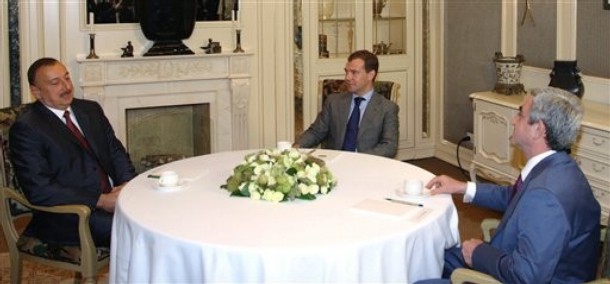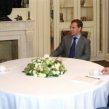
Aliyev and Sarksyan Meet in Moscow
Publication: Eurasia Daily Monitor Volume: 6 Issue: 139
By:

Azerbaijan’s President Ilham Aliyev met his Armenian counterpart Serzh Sarksyan in Moscow on July 17 in their latest round of reconciliation talks. Turkey has closely followed the talks between the two presidents, facilitated by the Russian President Dmitry Medvedev, hoping that the resolution of the Karabakh issue might also facilitate Turkish-Armenian rapprochement.
The meeting was the sixth between Aliyev and Sarksyan since their first meeting in June 2008. As one of the co-chairs of the OSCE Minsk group, Russia accelerated its peacemaking efforts toward finding a solution to the dispute between Armenia and Azerbaijan. Medvedev hosted the two presidents in Moscow for a second time in November 2008, and since then the two leaders have met in Zurich, Prague and St. Petersburg (Trend News, July 17).
The meeting came in the context of growing international interest. Other major actors had also expressed their support for this mechanism, hoping that it might facilitate a solution. The presidents of Russia, France and the United States issued a statement during the G8 summit in Italy the previous week, and urged all sides to step up their work toward the resolution of the remaining differences on Karabakh, on the basis of the principles outlined in the 2007 Madrid agreement (www.osce.org, July 10).
Representatives from the other two co-chairs of the Minsk group and the OSCE representatives were also in Moscow. On July 17, the Azeri Foreign Minister Elmar Mammadyarov and his Armenian counterpart Edward Nalbandyan met with the Minsk group co-chairmen Yuri Merzlyakov (Russia), Bernard Fassier (France) and Matthew Bryza (United States), as well as the OSCE Chairman’s Special Envoy Andzey Kasprzyk. The Azeri and Armenian presidents also held bilateral talks, and later the ministers as well as the co-chairs joined them. The following day, the leaders held trilateral talks with the participation of Medvedev.
No documents were signed at the meeting and no official statement was issued. Medvedev’s spokesperson told reporters that the parties had a chance to discuss in detail the remaining issues. He added that he is optimistic that "it will be possible to settle the Karabakh conflict in the foreseeable future." According to Armenian diplomatic sources, the presidents instructed their foreign ministers to work in close cooperation with the Minsk group co-chairs to organize a high-level meeting on Karabakh in the fall. The co-chairs of the Minsk group reiterated their support for the ongoing talks. They added that they would continue their contacts in the region. The two presidents might meet again in September, they added (Trend News, ITAR-TASS, www.ntvmsnbc.com, July 18).
On July 20, Mammadyarov said that some progress was achieved in Moscow. He added that the parties agreed on some principles of a possible solution, but that further work was required on the precise details. He maintained that both sides were working toward a schedule for withdrawal of the Armenian forces from the occupied Azeri territories. Once this is achieved, it will be possible to discuss other issues such as the repatriation of refugees, the rebuilding of the region and determining the status of Karabakh. However, he ruled out independence for Karabakh by saying "whatever its status, Karabakh will remain part of Azerbaijan" (www.ntvmsnbc.com, July 20).
Swedish Foreign Minister Carl Bildt, the head of the E.U. troika delegation visiting the region, said in Yerevan that the E.U. supported the Minsk group’s activities and was ready to assist in the implementation of an agreement. However, in implicit defiance of Mammadyarov’s statements, Nalbandyan said that the "return of any territories to Azerbaijan was not discussed in Moscow." He also added that Armenia did not officially endorse the Madrid principles (ANKA, July 20; Trend News, July 21).
Despite the contradictory accounts from Yerevan and Baku, it appears that the removal of Armenian forces from the occupied Azeri territories has been on the agenda for some time. Prior to the meeting in Moscow, Aliyev had explained the details of the plan to a Russian TV station (www.cnnturk.com, July 8). According to the Turkish press, the two presidents in fact discussed the specifics of Armenian withdrawal from the occupied Azeri territories, even including the deployment of international forces. Whereas, the Armenian side insisted on Russian forces, the Azeris requested Turkish troops. Turkey reportedly expressed its readiness to send troops, if the parties agreed on such a solution (Zaman, July 19). However, no official Turkish diplomatic source has corroborated this proposal.
Turkey has been supportive of the process led by the Minsk group and Russian initiatives. Ankara reportedly plans to contribute to the initiatives of the Minsk group through a new round of contacts with Baku and Yerevan. Nonetheless, currently the earliest direct talks between Yerevan and Ankara to discuss Turkish-Armenian normalization are scheduled in September at the U.N. General Assembly (Sabah, July 20).
After intensive diplomatic traffic between Turkey and Armenia, which resulted in the announcement of a roadmap for normalization in April, Ankara had to slow down the process to satisfy concerns in Baku. During his visit to Baku in May, Turkish Prime Minister Recep Tayyip Erdogan underlined clearly that Ankara would not proceed with its Turkish-Armenian rapprochement before a solution over the Karabakh issue could be achieved. Although Ankara came under criticism for stalling its dialogue with Yerevan, diplomatic sources maintain that secret talks between the two countries are continuing (EDM, June 30).
Commenting on these recent developments, Foreign Minister Ahmet Davutoglu denied that Turkish-Armenian normalization was stalled. He said that "[Turkish-Armenian and Azeri-Armenian] processes would affect each other positively." Though declining to set a date on the opening of the Turkish-Armenian border, he expressed his hope that positive developments might take place before the end of the year (Hurriyet Daily News, July 20).
Erdogan took a very clear position, saying that he will maintain his support for Azerbaijan over the Karabakh dispute. It would be difficult for him to step back from this, given the enormous costs of such a move to his popularity at home and in Baku. Therefore, before taking any steps to revitalize its relations with Yerevan, Ankara hopes that the recent initiatives could produce at least partial progress between Baku and Yerevan.




